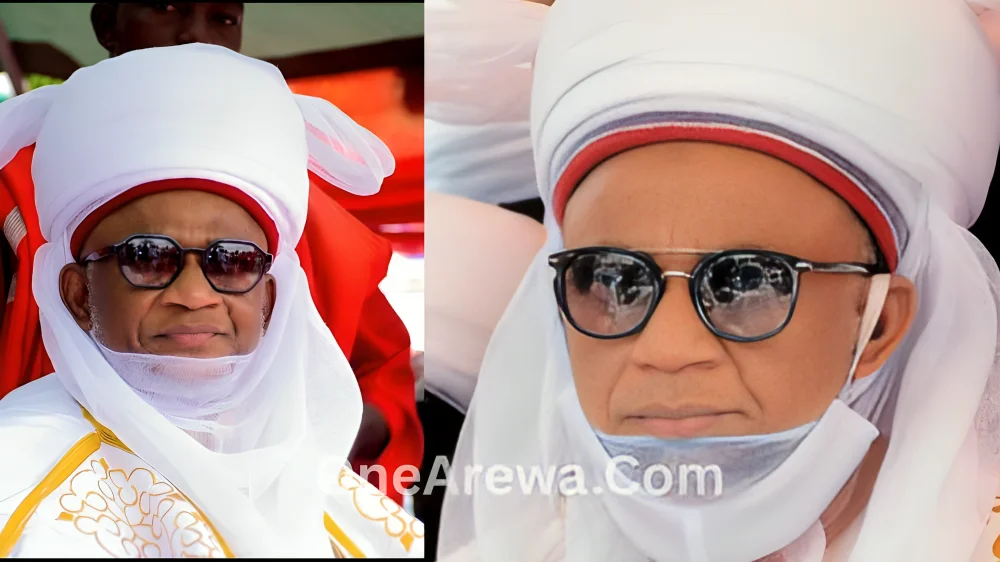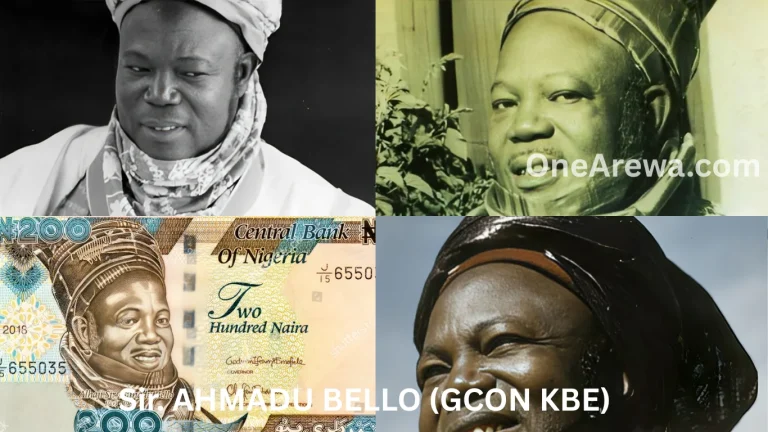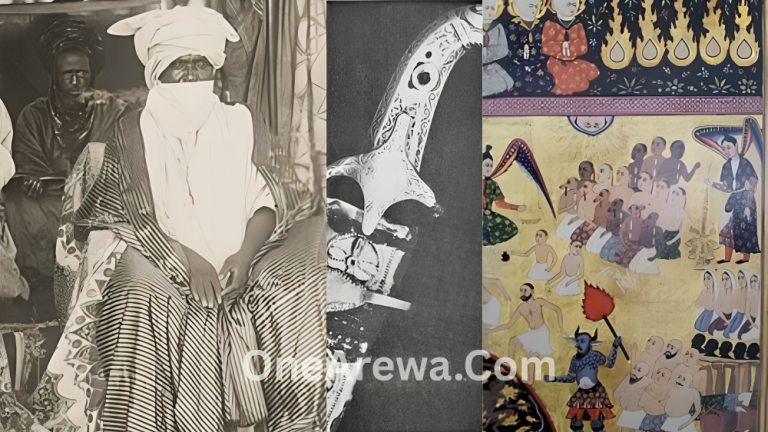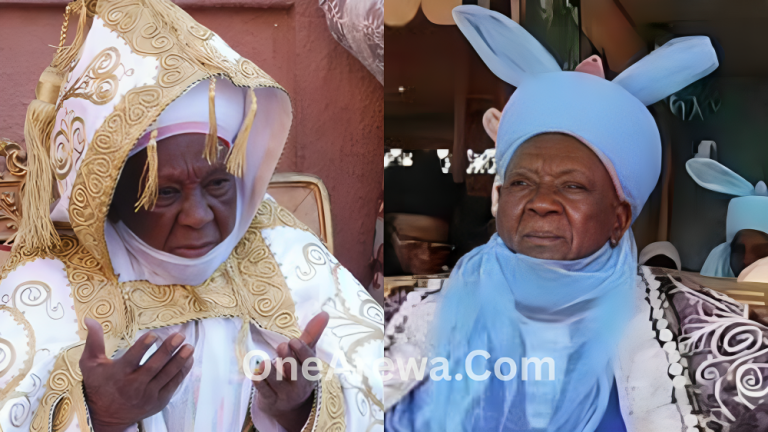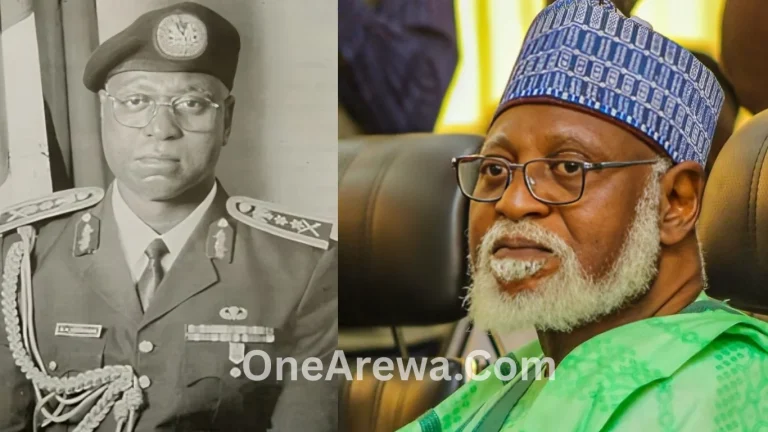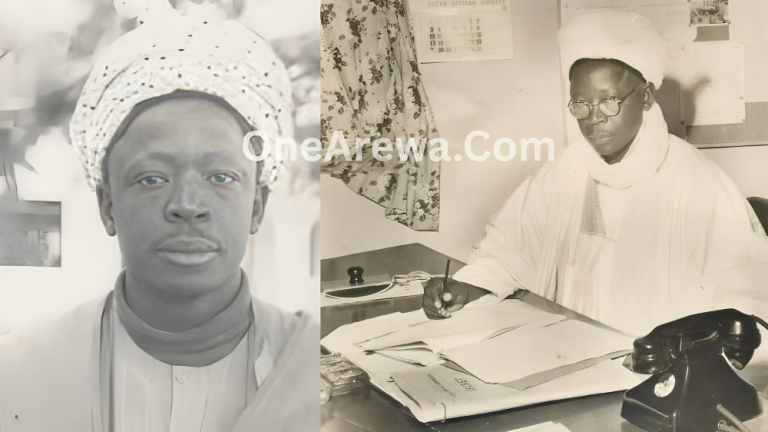Emir Yahaya Abubakar Nupé: Visionary Leader of the Nupé Kingdom Who Shaped Northern Nigeria’s History
Emir Yahaya Abubakar Nupé: Visionary Leader of the Nupé Kingdom Who Shaped Northern Nigeria’s History
Emir Yahaya Abubakar Nupé, born on September 12, 1952, in Bida, Niger State, is the 13th Etsu Nupe and a former Brigadier-General in the Nigerian Army.
He ascended the throne on September 11, 2003, after a distinguished military career.
As a ruler, he has been a strong advocate for peace, unity, education, agriculture, and cultural preservation among the Nupé people across Niger, Kwara, and Kogi States.
Under his leadership, events like Nupe Day were established to promote heritage, and initiatives like the Nupe Cultural Centre were launched.
Emir Yahaya Abubakar Nupé also chairs the Niger State Council of Traditional Rulers and has served as Chancellor for top Nigerian universities.
His reign is marked by visionary leadership, modernization of traditional roles, and active involvement in national development.
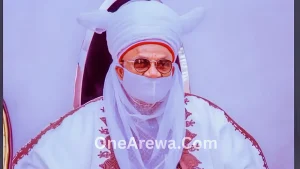
Emir Yahaya Abubakar Nupé Wikipedia
| Title | Details |
|---|---|
| Full Name | Yahaya Abubakar Sanganuwar Nakordi |
| Royal Title | Etsu Nupe (King of Nupe) |
| Military Rank | Brigadier General (Retired) |
| Honorifics | Dr., His Royal Highness |
| Date of Birth | 12 September 1952 |
| Age | 73 years (as of 2025) |
| Place of Birth | Bida, Niger State, Nigeria |
| Reign Began | 2003 |
| Coronation Date | 20 August 2003 |
| Predecessor | Umaru Sanda Ndayako |
| Dynasty | Usman Zaki Ruling House |
| Father | Alhaji Abubakar Saganuwa (Nakordi Nupe) |
| Mother | Princess Hajia Habiba Bantigi Ndayako |
| Religion | Islam |
| Spouse(s) | Married to Four Wives |
| Occupation | Ex-Military Officer, Traditional Ruler |
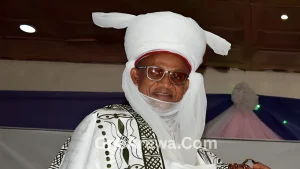
Early Life and Education of Emir Yahaya Abubakar Nupe
Emir Yahaya Abubakar Nupé was born on September 12, 1952, into the royal family of Bida, Niger State, Nigeria.
He is a direct descendant of Malam Dendo, the founder of the Nupé Kingdom, and the son of Alhaji Abubakar Saganuwa, who was a respected prince and a member of the Bida Emirate Council.
Growing up in a noble and disciplined environment, Yahaya Abubakar had early exposure to leadership, tradition, and public service.
His upbringing was deeply rooted in Islamic and cultural values, which shaped his character and sense of duty.
For his education, he began his early schooling in Bida, then proceeded to Government College Sokoto, where he completed his secondary education.
He later attended the prestigious Nigerian Defence Academy (NDA) in Kaduna, where he trained to become an officer in the Nigerian Army.
His military education and career helped instill strong leadership skills, strategic thinking, and a deep sense of patriotism, all of which prepared him for future roles in national service and traditional leadership.

Career of Emir Yahaya Abubakar Nupe
Before ascending the throne, Emir Yahaya Abubakar Nupé had a distinguished career in the Nigerian Army.
After graduating from the Nigerian Defence Academy (NDA), he rose through the military ranks, serving in various capacities with honor and integrity.
His career included key postings within Nigeria and abroad, where he gained deep experience in leadership, administration, and national security.
He later served as Director of Foreign Operations at the National Intelligence Agency (NIA) and retired with the rank of Colonel.
His time in the military and intelligence community made him well-respected for his discipline, strategic mindset, and dedication to the country.
Following the death of the 12th Emir of Bida, Alhaji Umaru Sanda Ndayako, in 2003, Yahaya Abubakar was selected and turbaned as the 13th Emir of Bida and the Chairman of the Nupé Traditional Council in September 2003.
Since then, he has become a voice of unity, peace, and progress, not just among the Nupé people but across Northern Nigeria.
As Emir, he has led numerous initiatives in community development, education, interfaith harmony, and youth empowerment.
His reign has been marked by a balance of tradition and modernization, making him one of the most respected traditional rulers in Nigeria.
Check Out: Emir Abubakar of Hadejia: The Visionary Leader Behind Hadejia’s Cultural and Community Development
Family of Emir Yahaya Abubakar Nupe
Emir Yahaya Abubakar Nupé hails from the respected Usman Zaki royal lineage, which traces its origins to the founders of the Nupé Kingdom.
His family background reflects strong royal and Islamic scholarly traditions deeply rooted in the history of Bida Emirate.
Father: Late Alhaji Abubakar Saganuwa – a prominent figure in Nupé land and a descendant of the first Emir of Bida, Usman Zaki.
Spouse(s): Emir Yahaya Abubakar is married and has several wives, in accordance with Islamic traditions. His wives play supportive roles in cultural and community events.
Children: He is blessed with children, many of whom are involved in various professional fields including government service, academia, and traditional leadership roles.
Extended Royal Family: The Emir belongs to a wide network of royal relatives who hold key positions across Nupé land and Northern Nigeria, maintaining the influence and continuity of the royal house.
The Emir values family unity, heritage, and education, and ensures that these principles are upheld among his children and descendants.
His household is known for its hospitality, discipline, and commitment to Islamic values and cultural preservation.
Other Positions Held by Emir Yahaya Abubakar Nupe
Apart from being the 13th Emir of Bida and Chairman of the Nupé Traditional Council, Emir Yahaya Abubakar Nupé has held several prestigious and influential positions within and outside the traditional institution, which have elevated his status as a national figure.
These include:
| Position | Role/Significance |
|---|---|
| Chairman, Niger State Council of Traditional Rulers | Leads traditional rulers in Niger State, coordinating peace, cultural preservation, and state affairs. |
| Chairman, Coordinating Committee of the National Council of Traditional Rulers of Nigeria (NCTRN) | Serves as a key figure in representing traditional institutions at the national level. |
| Patron of Several Islamic and Interfaith Organizations | Promotes religious tolerance, peacebuilding, and community engagement across religious divides. |
| Board Member, Various Educational and Developmental Institutions | Supports education, health, and social progress, especially within the Nupé Kingdom and Northern Nigeria. |
| Advocate of the Nupé Language and Culture | Leads the revival of Nupé heritage through festivals, language promotion, and historical documentation. |
Through these roles, Emir Yahaya Abubakar continues to be a unifying and developmental force across Nigeria, respected for his wisdom, diplomacy, and dedication to service.
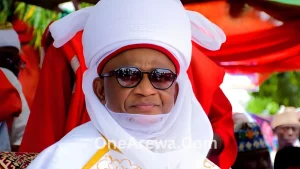
Detailed Trivia About Emir Yahaya Abubakar Nupe
1. 13th Emir of Bida (Etsu Nupe): Alhaji Yahaya Abubakar became the 13th Emir of Bida in 2003, following the death of his uncle, Alhaji Umaru Sanda Ndayako, who reigned for 28 years. His appointment was widely celebrated among the Nupé people due to his royal pedigree and outstanding public service record.
2. Descendant of Mallam Dendo: He hails from a long and respected line of royalty. He is a direct descendant of Mallam Dendo, the Fulani Islamic scholar and warrior who established the Nupé emirate dynasty in the early 19th century after the Fulani Jihad.
3. Military Career – Brigadier General: Before becoming emir, Yahaya Abubakar served in the Nigerian Army, rising to the rank of Brigadier General. His military background shaped his disciplined leadership style, strategic thinking, and respect for order and security.
4. Educational Background: He attended Government College, Sokoto, and later joined the Nigerian Defence Academy (NDA), Kaduna. His military and academic training prepared him for high-level leadership responsibilities.
5. Peacebuilder and Mediator: As Emir, he has been a champion of peace and inter-ethnic dialogue. He is known for mediating local disputes and working closely with the government to ensure unity among the Nupé people and their neighbors.
6. Chairman, Niger State Council of Traditional Rulers: His wisdom and experience earned him the role of Chairman of the Niger State Council of Traditional Rulers, where he works closely with other monarchs on issues of development, security, and tradition.
7. Role in Jama’atu Nasril Islam (JNI): He serves as the Coordinator of JNI in Niger State, an Islamic organization that promotes religious knowledge, tolerance, and unity among Muslims. His religious leadership is widely respected.
8. Promoter of Nupé Culture: Emir Yahaya Abubakar is deeply passionate about preserving and promoting Nupé heritage. He initiated Nupé Cultural Day, which brings together sons and daughters of the kingdom to celebrate their history, music, language, and attire.
9. Member, National Council of Traditional Rulers of Nigeria (NCTRN): He plays an active role in national affairs through the NCTRN, advising on cultural matters, governance, and the role of traditional institutions in modern Nigeria.
10. Multilingual Leader: The Emir speaks Nupé, Hausa, and English fluently, enabling him to communicate effectively across diverse communities and serve as a bridge between tradition and modernity.
11. Family-Oriented Leader: He is a father to many children, several of whom hold positions in business, public service, education, and Islamic scholarship. His family is known for upholding values of humility, service, and excellence.
12. National and International Recognition: The Emir has received numerous awards and honorary titles for his contributions to peace, education, and community development, both within Nigeria and internationally.
Check Out: Shehu Muhammad al-Amîn al-Kanemi (1776 – 8 June 1837)
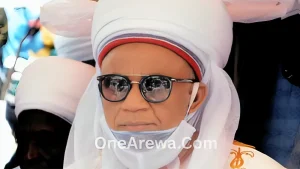
Legacy of Emir Yahaya Abubakar Nupe
Emir Yahaya Abubakar Nupe leaves behind a powerful and enduring legacy as a visionary traditional ruler, a bridge between the old and the new, and a champion of peace, education, and cultural revival in Northern Nigeria.
Since ascending the throne in 2003, he has worked tirelessly to uphold the values of the Nupe Kingdom while adapting the emirate’s relevance to modern governance, development, and social change.
One of his most notable achievements is the revival and promotion of Nupe culture and identity.
Under his leadership, events like Nupe Day were institutionalized, celebrating the rich history, language, and traditions of the Nupe people and fostering unity across generations.
He also played a significant role in preserving traditional institutions while fostering strong collaboration with the state and federal governments.
As a former military officer, Emir Yahaya brought discipline, strategy, and national perspective to his traditional leadership.
His role as Chairman of the Niger State Council of Traditional Rulers and a senior member of the National Council of Traditional Rulers of Nigeria (NCTRN) positioned him as a key influencer in inter-ethnic dialogue, peacekeeping, and policymaking.
He is also recognized for his commitment to education and youth empowerment, encouraging educational development across the Nupe Kingdom and supporting initiatives that target poverty alleviation and women’s participation in development.
His spiritual leadership as Coordinator of Jama’atu Nasril Islam (JNI) in Niger State underscores his devotion to religious tolerance, moral guidance, and community service.
Through his reign, Emir Yahaya Abubakar has emerged as a respected elder statesman, symbolizing wisdom, unity, and progress.
His legacy is deeply etched in the modern renaissance of the Nupe Kingdom, making him one of the most influential traditional rulers in contemporary Nigerian history.
FAQs
1: Who is Yahaya Abubakar Nupe?
Emir Yahaya Abubakar Nupé is the 13th Etsu Nupe (Emir of Nupe), a retired Brigadier General, and traditional ruler of the Nupé people in Nigeria. He ascended the throne in 2003 after the passing of Umaru Sanda Ndayako.
2: When was Yahaya Abubakar crowned as Etsu Nupe?
He was officially crowned on August 20, 2003, after being selected as the successor to the late Emir.
3: What is the historical significance of the Etsu Nupe title?
The title Etsu Nupe means “King of Nupe.” It is one of the most respected traditional thrones in Nigeria, with deep cultural, religious, and political significance in Northern Nigeria.
4: What is Emir Yahaya Abubakar’s educational background?
He attended Government College Bida and the Nigerian Defence Academy. He also studied in various military institutions locally and abroad, earning professional and honorary distinctions.
5: What was Yahaya Abubakar’s career before becoming Etsu Nupe?
He was a Brigadier General in the Nigerian Army, serving in multiple leadership and strategic defense roles before retiring and ascending the throne.
6: What are some achievements of Etsu Yahaya Abubakar?
His reign has been marked by peacebuilding efforts, cultural preservation, educational advocacy, and contributions to religious unity and community development in the Nupe Kingdom and beyond.
7: What roles does Emir Yahaya Abubakar Nupé hold beyond being a traditional ruler?
He is the Chairman of the Niger State Council of Traditional Rulers and has served in national religious councils, including as Chairman of the Nigerian Inter-Religious Council (NIREC).
8: Is Etsu Nupe Yahaya Abubakar married?
Yes, he is married to four wives and has a large royal family.
9: What is the legacy of Emir Yahaya Abubakar Nupé as a traditional ruler?
His legacy includes strong leadership, promotion of Nupe cultural heritage, interfaith dialogue, educational development, and national peace advocacy.
10: What ruling house is Emir Yahaya Abubakar Nupé from?
He hails from the Usman Zaki Ruling House, one of the royal houses of the Nupe Kingdom.
In conclusion
Emir Yahaya Abubakar Nupe stands as a visionary and influential leader whose military background, dedication to peacebuilding, and commitment to preserving the rich cultural heritage of the Nupé Kingdom have significantly shaped Northern Nigeria’s history.
Since his coronation in 2003, he has not only strengthened the unity and development of his people but also played a vital role in fostering interfaith harmony and promoting education.
His enduring legacy as Etsu Nupe continues to inspire generations, making him a respected figure both within and beyond his kingdom.
Check Out: Shehu Usman Dan Fodio: The Islamic Scholar Who Founded the Sokoto Caliphate (1754–1817)
Check Out: General Abdulsalami Abubakar: The Military Leader Who Brought Back Democracy to Nigeria (1998–1999)
